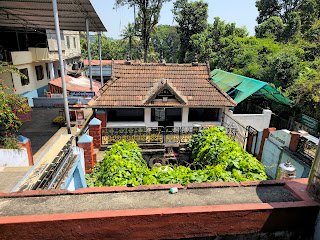Vidyarambham is a traditional South Indian ceremony that marks a child's formal initiation into learning. Celebrated with deep significance on Vijaya Dashami, the final day of Navratri, this ritual typically takes place in October or November. It signifies the beginning of a child's educational journey, where children between the ages of 3 and 5 are introduced to reading and writing.
Ritual and Symbolism
 |
| Vidyarambham ceremony and children, prokerala.com |
.jpg) |
| Chottanikkara Devi Temple, Ernakulam i.ytimg.com |
 |
| Panachikkadu Saraswathi Temple, Kottayam ImageVis M upload.wikimedia.org |
 |
| Thunchan memorial, Thrissur.Image; icharam upload.wikimedia.org |
.jpg) |
| Thunchan memorial, Thrissur. i.ytimg.com |
 |
| Thrikkavu temple, kerala pinterest.de/pin |
Above image: one of the 108 Durga temples established by Parasurama.
Kerala: Temples as Key Venues
In Kerala, Vidyarambham is often performed in temples, where families gather to celebrate this sacred event. Popular temples include:
Thunchan Parambu, Thrissur: This historic site is the birthplace of Thunchath Ezhuthachan, the father of the Malayalam language. The tradition of initiating children into learning here continues, with 4,000 to 5,000 families participating each year. The ceremony begins as early as 4 a.m. and lasts until the afternoon. The ceremony falls in October or November.
Panachikkadu Saraswathi Temple, Kottayam: Known as the "Dakshina Mookambika," this small temple sees a large number of families each year for Vidyarambham, especially during Navratri, as children are blessed by Goddess Saraswati.
Attukal Bhagavathy Temple, Thiruvananthapuram: Famous for the Pongala festival, this temple dedicated to Kannaki Devi also hosts Vidyarambham every year, attracting many families to participate.mosrly women in large numbers gather here on the pongal day.
Chottanikkara Devi Temple, Ernakulam: Known for its “Makam Thozhal” festival in February, the temple conducts Vidyarambham as part of its special rituals.The ceremony starts at 8.30 in the morning and may go up to 11 am . The children are introduced to reading, writing and asthmatics
Thiruvullakkavu Sree Dharma Sastha Temple, Thrissur: This temple in Cherpu village of dedicated to Lord Ayyappa, is a popular spot for Vidyarambham, with the belief that the deity though fiery in nature, blesses children with wisdom and knowledge.
Temples in Kerala, such as the Dhakshina Mookambika Temple in North Paravur, offer the ceremony even outside the Navratri period, providing flexibility for families. The Travancore Devaswom Board conducts the vidyarambham ceremony daily. Lots of families come here for induction of their toddlers into education. Here, the ceremony begins only after the completion of puja to the main deity by the head priest around 2 am. The advantage is it is not restricted to Navaratri season and Vijayadashami day (10th day of Navaratri).
Vidyarambham is not just a ritual but a cultural tradition deeply embedded in South Indian families, offering divine blessings for the child’s future learning and growth.









